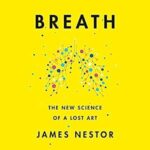Why Is Deep Breathing Important?
When we think of the best ways to improve our health, we immediately think of our diet, exercise, and fitness. Things we can easily measure like how many calories I’m consuming, how many carbs we, whether we’re eating healthy foods, or how much exercise we do in the week.
But we rarely pay much attention to an activity that we unconsciously perform all the time, and that has great importance in our health: breathing.
We inhale and exhale about 22,000 times a day. And we do this without thinking. Eventually, we take a deep breath, perhaps intentionally, and we feel calmed down and relaxed. If we ask ourselves when was the last time I took a deep breath? Maybe we do it only a few times a day, and not as often as we think.
But why is deep breathing important? Deep breathing is one of the easiest, most convenient, and most natural ways to fight stress and anxiety, reduce pain, reduce high blood pressure, and even aid in digestion. But it has many more benefits that we will see later.
Este artículo también está disponible en Español
Technically, what is Deep Breathing?
To fill our lungs with air, and then release it, our respiratory muscles have to work. Our diaphragm moves up and down, breathing air in and out of our lungs, while the intercostal muscles widen the rib cage. At times when our body demands more oxygen, the scalene muscles and the muscles of the neck and back help by elevating the rib cage.
There are two basic types of breathing: thoracic breathing and diaphragmatic breathing. Thoracic breathing uses the upper muscles of the chest to carry oxygen to the lungs, and it is the one we most commonly do. Diaphragmatic breathing or “deep breathing” uses the body’s dominant respiratory muscle: the diaphragm.
The diaphragm is a concave, umbrella-shaped muscle that is located just below the lungs. It is our most important respiratory muscle. It works similarly to a plunger: when we inhale air, the diaphragm contracts, goes down, and the air fills our lungs. When we exhale the air, the diaphragm expands, rises, and the air is expelled.
Deep breathing is done using mainly the diaphragm. During diaphragmatic breathing, you breathe deeply from the belly. Your belly expands while your chest remains flat.
Strengthening of the Respiratory Muscles
Like the other muscles in our body, the respiratory muscles can be exercised to improve their functioning. There are a wide variety of exercises that can help us, from stretching exercises to strength exercises.
There is a lot of documentation available about it, including free videos on YouTube and other platforms. Choose the exercise of your preference. As a result of these exercises, we can even increase our lung capacity, which will allow us to inhale more air and thus increase the supply of oxygen that enters our body with each breath.
What are the Benefits of Deep Breathing?
Inhaling more oxygen in each breath brings many benefits to our bodies. Not only for high-performance athletes or people with some respiratory deficiency, increasing our lung capacity is recommended for everyone, even if you do not feel the need to take more air than you currently take.
Let’s see what benefits we can obtain by providing more oxygen to our body through deep breathing:
Reduces Stress and Anxiety, Increase Calm
When you become stressed or anxious, your brain releases cortisol, the”stress hormone”, as it exerts various actions in response to stressful situations. However, cortisol also fulfills other important functions such as regulating metabolism, reducing inflammation, and contributing to immune system functioning.
When we have chronic levels of stress, cortisol always stays high in our body, which is to say that we are in a state of continuous alertness and struggle, and the systems indispensable for our survival do not work as they should.
The systems most affected by chronic stress are the immune system because excess cortisol lowers the defenses, the gastrointestinal system because it affects the absorption of food and inflammation and irritation of the intestinal mucosa occurs, the cardiovascular system because it increases blood pressure, the brain because the state of alert of our body prevents us from sleeping well and having a deep and restful sleep.
By breathing deeply, the heart rate slows down, more oxygen enters our bloodstream, and our brain relaxes. Deep breathing also increases endorphins, the substance our body makes to relieve pain and give a sense of well-being.
In short, stress is controlled and cortisol levels are reduced.
Improves Immune Function
When fully oxygenated, your blood transports and absorbs nutrients and vitamins more efficiently. Essentially, the cleaner the blood, the harder it will be for diseases to remain in your system.
The simple act of breathing slowly and deeply moves the lymphatic fluid and promotes blood circulation much more effectively. Our immune system will work much better if the lymphatic and circulatory systems are activated properly.
The stimulation of the lymphatic system also helps to detoxify our body, since lymph is responsible for collecting toxins, bacteria, and dead cells that circulate in our bloodstream for subsequent elimination.
In addition, it is important to reduce stress to promote immune function. Conscious breathing and visualization exercises have been shown to reduce stress and improve immune function.
Lowers Blood Pressure
Deep breathing reduces blood pressure. As our muscles relax, our blood vessels dilate, improving circulation and lowering blood pressure. Deep breathing also helps regulate heart rate, which also helps lower blood pressure.
Controlling blood pressure and heart rate significantly benefits our cardiovascular system, reducing the risks of heart disease, the leading cause of death worldwide.
Improves Digestion.
When we breathe deeply, we promote a healthier blood flow, which in turn promotes your organs to function more effectively, including our intestines.
Diaphragmatic breathing can stimulate the parasympathetic nervous system, which controls the involuntary functions of our body, regulating our nervous and digestive systems. It promotes salivation and restores normal blood flow to the organs that aid digestion. This can help to avoid digestive discomfort and helps to enjoy meals more.
Reduces Inflammation
Inflammation is our body’s natural response to injury or damage to some tissue. Our body constantly protects us from injuries, toxic agents, and other invaders, which cause inflammation.
When our body is subjected to continuous injury or damage, inflammation becomes chronic. While inflammation is a natural response to healing damage, it can damage the cells in our body when it becomes chronic.
Many common diseases today, such as heart disease, stroke, digestive disorders, cancer, mental health problems, arthritis, and cancer, are associated with chronic inflammation.
The biggest factor contributing to inflammation in our modern world is stress. The continuous demand for performance makes our body almost always activated in alert and survival mode.
Take a deeper breath more often, relax and reduce your stress. This also helps reduce the risks associated with chronic inflammation.
Fast Recovery
When we face an imbalance caused by any anomaly, whether, of internal or external origin, our body seeks to return to balance by activating different feedback control systems that constitute the mechanisms of self-regulation.
This natural search of our body to maintain its balance at all times is called homeostasis, and its response mechanisms are varied depending on the nature of the factor that causes the imbalance. For example, the response to balancing body temperature is different from the response to balancing blood pH, blood sugar, or wound healing.
Our body has the amazing ability to take care of and repair itself. But you need time for it. Rest is vital for recovery from an imbalance, damage to the body, or infection, to conserve energy and allow its recovery.
A relaxed body, without stress, with a high supply of oxygen, with optimal blood flow, and with deep and restful sleep, will recover more quickly. You can give your body this state necessary for recovery by taking deep breathing.
VIEW OUR RECOMMENDED PRODUCT:
Transform Your Life with the Power of Breath
Discover how to breathe better, live better, and feel better with Breath, the new science of a lost art by James Nestor. This groundbreaking book reveals the secrets of optimal breathing for health, performance, and happiness. You’ll learn how to improve your breathing habits, enhance your oxygen intake, and unlock your full potential. Click Here to find out how Breath can change your life for the better.
Conclusion
Although we usually pay little attention to our respiratory process, the benefits we get from deep or diaphragmatic breathing are very varied and important, but the greatest contribution comes from the relaxation and tranquility it provides us, since this offers us additional benefits.
It is worth considering a routine several times a day to activate these benefits. But if we do not have the habit of doing deep breaths frequently, surely our respiratory muscles will need to develop. We can achieve this through different exercises, which we must choose according to our conditions.
Diaphragmatic breathing is most effective when you feel rested. Try one or more techniques to see which works best for you by giving you the most relief or relaxation.
Diaphragmatic breathing can help relieve some of your symptoms in the case of COPD or other conditions related to your autonomic nervous system. Check with your doctor or specialist if you are interested in exercising to improve your breathing.






